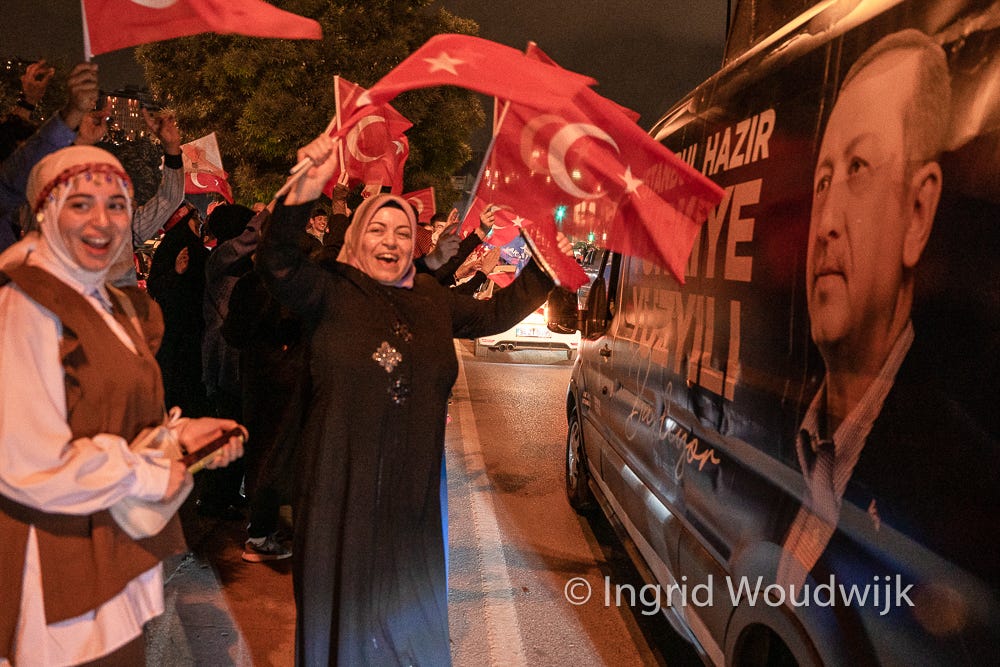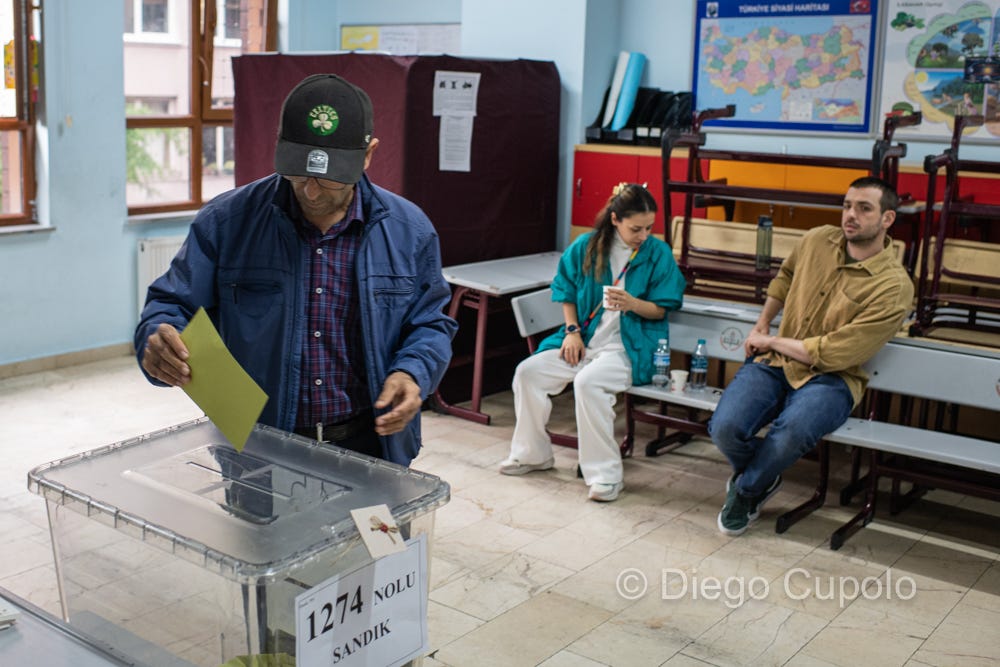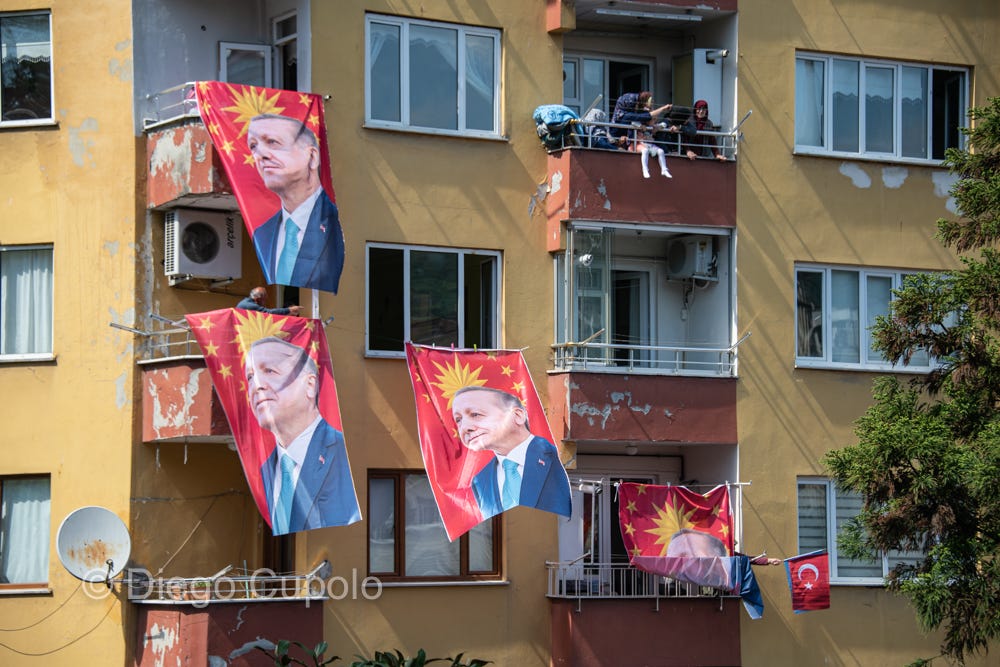Some prefer le même chose. We prefer to choose memes.
But if you prefer to make sense of the Turkish elections, our live panel with Sibel Oktay, Selim Koru and Merve Tahiroğlu will give you a good head start. Thanks to all who joined!
And for quake zone updates, don’t miss Burcu Özkaya Günaydın’s report on pre-election prep (or the lack of it) in Hatay.
As we enter Turkish Pres. Recep Tayyip Erdoğan’s third decade in power, voters’ reactions can be divided into three main categories:
The first group is cheering because they won.
The second group is in despair, increasingly looking for ways to live abroad.
And the third group has no choice but to stay and sometimes to stay quiet, best exemplified by this interview.
Now that the electoral cycle is over, foreign governments are also forming their reactions and contingency plans for the road ahead, which does not look “very promising” according to the European Parliament's rapporteur on Turkey Nacho Sánchez Amor.
“Among the first statements by Erdoğan [after Sunday’s elections] was an attack on LGBT people and there was another aggressive statement towards the European Union regarding visa liberalization,” Amor told Turkey recap in an interview Wednesday.
“Let me be clear, if we don’t have visa liberalization, it’s just because the Turkish government didn’t comply with a benchmark that the Turkish government committed to comply with,” he continued, referring to amendments to data protection and anti-terror legislation.
To cover the basics: Erdoğan was re-elected in runoff presidential elections Sunday with a four percent margin (roughly 52-48) over opposition candidate Kemal Kılıçdaroğlu. This means the same party will govern Turkey for up to 25 years or more through elections described as “free but not fair” by international observers, though the “free” part is now coming under more scrutiny.
Noting severe curtailments on free speech, the jailing of political opponents and the disregard for rulings by the European Court of Human Rights (ECHR), Amor said European governing bodies would need a “new format” to manage relations with Turkey, admitting the EU accession process had failed to strengthen core democratic principles in the country.
“My main message for the coming months is we have to look for another format in our relations,” Amor told Turkey recap, adding that in his view, “We can’t continue with this cynical process designed, theoretically, to conduct membership, but [without ever] reaching this target.”
Amor went on to say Turkey’s frozen accession process made space for European officials to consider alternative approaches. Future relations may operate under an “umbrella of agreements”, Amor hinted, which would involve various components to handle migration, customs union modernization, visa liberalization, foreign policy and so on.
“But to me it’s clear that the accession process [cannot] endure, because I don’t see what could be the incentive for President Erdoğan to change domestic policies,” Amor said, adding Turkish voters had apparently endorsed the president’s approach.
He continued, “When there is no political will to become a democracy, and this is the case of the ruling elite in Turkey, there is no way to impose democratic standards if the political will is to go towards an authoritarian model of government.”
“We have to recognize the accession process has not protected any single critical-thinking, democratic body or committed person. The basic condition of accession is the political will to become a democracy,” Amor told Turkey recap.
Regarding elections, Amor said he fully endorsed the conclusions or international electoral missions (more below), acknowledged the results and would seek to continue discussions with counterparts in Ankara, underlining EU bodies would keep supporting civil society in Turkey.
On ECHR rulings, he said Turkey will be subject to infringement proceedings if it doesn’t apply court rulings for the immediate release of jailed Turkish philanthropist Osman Kavala and former HDP co-chair Selahattin Demirtaş (more below).
Amor summed up his views on ECHR adherence by addressing Turkey directly, saying: “You’re a member of the Council of Europe, you participated in the [court] process, you defended your views, and you lose and you don’t comply?”
“This is not about politics, this is about seriousness,” Amor continued. “This is about being reliable as a country and Turkey, in this moment, in many, many fields is not reliable, is unpredictable and for that reason is suffering enormous damage in its international image.”
On the subject of international image, Erdoğan pulled out “last minute” from a European Political Community summit in Moldova today (Thursday), which was meant to show of solidarity against Russia amid the ongoing invasion of Ukraine. More on that to come.
– Diego Cupolo
Level battering field
Reports of violent incidents and irregularities marked Turkey’s elections since the early hours of voting Sunday.
Throughout the day, news reports from different regions indicated groups of people, many allegedly affiliated with AKP, attempted to force their way into voting stations and threatened election staff.
In one incident, a bag of votes went missing in İstanbul and was found only after voters’ filed objections. In another, an MHP official was caught voting twice on two different ballots.
CHP MP Ali Şeker was also attacked in the southeastern province of Şanlıurfa, where he was on ballot observation duty. More violent acts were reported against opposition officials elsewhere.
As for international observers, they highlighted media bias during the campaign period as well as restrictions on free speech, with the OSCE concluding Turkish elections were “free but not fair” in a statement Monday.
The initial report also noted vast differences in media visibility among the candidates, which was found to give a clear advantage to the incumbent.
Demirtaş out
It was quite the week for Selahattin Demirtaş, a prominent Kurdish politician who has been in prison since 2016 despite ECHR rulings to free him.
After he backed Kılıçdaroğlu once again in the second round – inspiring many memes – Erdoğan vowed to keep Demirtaş in prison as long as he remains in power. Though that apparently is not enough for the Erdoğan supporters who chanted ‘hang Selo’ during his victory speech.
On Tuesday, Demirtaş penned an article for ArtıGerçek, criticizing the HDP and their campaign, saying it started too late and was run unprofessionally, like an amateur association. One day later, he announced he would step back from active politics for now.
“I sincerely apologize for not being able to put forward a policy that is worthy of our people,” he wrote.
In a more extensive interview with ArtıGerçek, he added that he was ready to be a presidential candidate to increase the Kurdish vote rate, but the HDP leadership rejected this. HDP spokesperson Ebru Günay today (Thursday) cited judicial reasons for the decision.
In our Q+A, Sibel Oktay pointed out that Demirtaş, so far, is the only leader that resigned following the opposition’s electoral loss, which should be taken as a lesson for others.
“That man did more for the opposition than every single leader of the Table of Six combined,” she said.
A double game
World leaders rushed one by one to congratulate Erdoğan on his victory night. Among the first in line was the Russian Pres. Vladimir Putin, who reportedly praised Erdoğan for his “independent foreign policy.”
That could also mean more “independence from West” as Turkey becomes increasingly dependent on Russia for energy and trade relations. With the two leaders expected to meet soon, foreign policy expert Selin Nasi opined in Politico that Putin may ask Erdoğan to return some favors following Moscow’s energy investments and deferred gas payments for Turkey.
However, US Pres. Joe Biden was also among those welcoming Erdoğan’s election win. Some argue Turkey remains a critical NATO ally, and deteriorated relations, can be stabilized for the benefit of all parties during Erdoğan’s next term.
What that looks like remains to be seen as the US continues to pressure Ankara on Russian sanctions and on resolving the NATO enlargement deadlock given Sweden’s new anti-terror legislation goes into effect today (Thursday).
For its part, Ankara is waiting for approval on the F-16 fighter jets purchase bid, which Biden linked to Sweden’s accession bid in his phone call with Erdoğan Monday.
With the next NATO summit in July, and high expectations to finalize Sweden’s bid in time for the gathering, Turkish officials have yet to signal whether Ankara will flash the green light.
Lightning McGlean
Even though markets had already priced in an Erdoğan victory before May 28, the Turkish lira hit new record low levels this week ahead of the announcement for a new cabinet in Turkey.
The biggest question is whether or not the former economy chief Mehmet Şimşek is in it. And the answer is he may very likely be either a finance minister or a VP responsible for the economy, as Reuters reported and several sources told Turkey recap.
Yet the questions do not stop with this since uncertainty continues regarding Şimşek's capability to return the country to more conventional policies, given Erdoğan's long-held view that higher interest rates cause higher inflation.
"We do not expect a reversal in interest rate policy post-elections," Morgan Stanley analysts told Bloomberg. "However, the recent stress on official reserves amid large external finance needs and high inflation seemingly would require a change in policy direction to contain macro stability risks."
In a note to clients, Timothy Ash, a senior strategist at BlueBay Asset Management, reiterated the old problems Şimşek experienced with the president – and the fate of previously sacked officials like Naci Ağbal and Lütfü Elvan – were rooted in their support for economic orthodoxy.
"The market will be cautious herein, after rallying initially on a Şimşek appointment," Ash wrote. "Şimşek can, and likely will, stabilize the situation, but for how long will depend on the length of his own tenure in office and really how much economic policy freedom he is given."
Meanwhile, the financial impacts of the elections saw Turkey's GDP grow 4 percent year-on-year in the first quarter, TurkStat announced Wednesday.
This more-than-expected expansion was mostly due to Erdoğan's pre-election spending spree and strong household consumption. Both Bloomberg economists and Goldman Sachs analysts expect a shift to orthodoxy in policies followed by a shrinkage in the growth. More to come.
Snack jacket
And because content is easier to find than contentment, here are some silly news bits to snack on till next week. Don’t eat them all at once!
Erdoğan fans appear to be an enlightened bunch, but watt about this one?
The Feb. 6 quakes created new hot springs in Kayseri, giving skiers something to do between the slopes and pastirma breaks.
This year’s Marmara Sea plague is poisonous jellyfish. It’s snot getting better.
After the Kılıçdaroğlu-PKK fake video controversy, a man filed a complaint against Erdoğan and got into real legal trouble.
Speed reads
The Turkish Elections Swung from Hope to Despair (New Yorker)
Police erect barricades around İstanbul's Gezi Park on 10th anniversary of massive protests (Bianet)
Turkey's Erdoğan faces struggle to meet Syrian refugee promise (Reuters)
Turkey's Merve Dizdar wins best actress at Cannes (AFP)
The Aleppo electronic artists using music to heal in Gaziantep (AJ)
Lavrov warns West: Black Sea grain deal is in danger of collapse (Reuters)
Turkey to investigate media outlets over election coverage (VOA)
Egypt's Sisi, Turkey's Erdoğan agree on reinstating ambassadors, Egypt's presidency says (Reuters)
Turkish artists fear crackdown after Erdoğan wins election (The Art Newspaper)
Weekend reads
A Fetih Accompli: How Erdogan Married Religion and Nationalism
Basically arguing Erdoğan is the equivalent of a Hollywood blockbuster that offers a little something for everyone, historian Nicholas Danforth writes: “Where observers focused on the divide between religion and nationalism, Erdogan grasped how effectively they could be wielded together.” (New Lines)
Erdoğan’s Russian Victory
Likely touching on many topics discussed in Erdoğan-Putin phone calls, Soner Çağaptay outlines recent bilateral relations, writing: “The tactics [Erdoğan] used—controlling which candidates ran against him and dominating the information space with false news—come right out of Putin’s playbook.” (Foreign Affairs)
Far-Right at the Center
Detailing the history of the far-right political tradition, researcher Reuben Silverman writes: “The central dilemma of Turkey’s politics is that any center-left bid to defeat Erdoğan requires the support of Kurdish voters but the balance of power in Turkey is held by far-right parties that will not work with leftist Kurdish politicians.” (Reuben Silverman)
Week ahead
Jun 1 MEI hosts a webinar titled "How Will Presidential Election Results Affect Turkey’s Regional Outlook?" at 1400 GMT
Jun 2 Oxford Political Review hosts a webinar titled "Turkey's Elections: The Frontline of Democracy" at 1600 GMT
Jun 5 The “child bride trial” of Yusuf Ziya Gümüşel and Kadir İstekli resumes in İstanbul
Jun 5 TurkStat publishes inflation statistics for May 2023
Jun 5 FPRI hosts a webinar titled "Turkey’s Elections and Foreign Policy Implications" at 1900 GMT
Jun 6 The trial of Amnesty International resumes in İstanbul
Jun 7 The Demokratik Modernite trial of five journalists resumes in İstanbul
Jun 8 Trial of documentary filmmaker and journalist Sibel Tekin resumes in Ankara
Turkey recap is an independent news platform supported by readers via Patreon and Substack. Supporters get access to our Slack channel, timelines, calendar and more.
We also invite you to visit our merch store, but if you simply liked what you’ve read, subscribe here or share it with a friend. Queries and pitches: info@turkeyrecap.com.
Diego Cupolo, co-founder + editor @diegocupolo
Gonca Tokyol, freelance journalist @goncatokyol
Ingrid Woudwijk, freelance journalist @deingrid
Verda Uyar, freelance journalist @verdauyar
Gökalp Badak, editorial intern @gklpbdk







